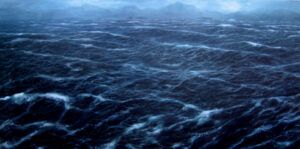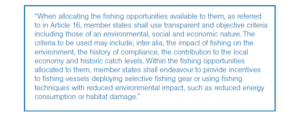 There are a lot of heads swimming right now, as Brexit puts the proverbial shark amongst the mackerel. ‘Leaving the EU’ (whatever that actually ends up meaning in the evolving, devolving politics of the UK) does in theory have very significant implications for the management of our seas. Perhaps more than any other policy sphere or industry, managing our sea area demands deep cooperation across national borders. Ocean currents and energy sources flow across our territorial boundaries and so do a lot of other things: fish, pollutants, boats, whales and people. What happens in one part of the sea often affects everyone else – we are all connected. It’s a simple fact, with complicated political consequences.
There are a lot of heads swimming right now, as Brexit puts the proverbial shark amongst the mackerel. ‘Leaving the EU’ (whatever that actually ends up meaning in the evolving, devolving politics of the UK) does in theory have very significant implications for the management of our seas. Perhaps more than any other policy sphere or industry, managing our sea area demands deep cooperation across national borders. Ocean currents and energy sources flow across our territorial boundaries and so do a lot of other things: fish, pollutants, boats, whales and people. What happens in one part of the sea often affects everyone else – we are all connected. It’s a simple fact, with complicated political consequences.
Brexit presents a challenge. Over the last 40+ years, our politicians have engaged with the European legislature to create a necessarily complex raft of measures to deal with international problems:
Birds Directive (1979, amended in 2009) – to halt the decline of bird populations across Europe
Common Fisheries Policy (1983/2014) – to halt the decline of fish stocks across Europe
Habitats Directives (1992) – to halt the decline of species and habitats across Europe
Water Framework Directive (2000) – to address the decline in ecological health of water bodies across Europe
Marine Strategy Framework Directive (2008) – to address the decline in ecological health of seas across Europe
Many of these Directives have provided the impetus – and crucially a shared framework – for taking coordinated action. The Water Framework Directive for example requires that Member States achieve certain levels of water quality and ecological health within rivers and coastal waters after the cumulative damage wrought by decades of weakly regulated industrial activity and urbanisation.
There’s no shying away from it, Europe for all its remote technocracy has helped to give Member States an environmental backbone. So will Brexit mean we are left with spineless government back to pursuing short-term economic growth at the expense of shared natural assets?
Some of our campaign members have been quick to raise the issue and Roseanna Cunningham has since pledged to maintain environmental laws as uncertainty around our future relationship with the European Union unfolds.
But of course the devil will be in the detail. We take a look at a few of the “deep blue holes” that would need filled in a post-Brexit world:
Brexit and the fish
Fish is a big deal for us. Scotland has the 4th largest sea area in ‘core EU waters’ and our Producer Organisations own around 70% of UK quota allocation. Long-in-the-tooth political commentators regard that British fishing rights were “sold down the river” during the early expansion of the European Union. But coupled with industry consolidation and technological advances this led to a ‘tragedy of the commons’ in which all ‘Member States’ have been complicit. The resultant Common Fisheries Policy – tasked with dealing with over-capacity in the fleet and declining fish stocks – also led to decommissioning and the wasteful practice of discards which have left deep scars across the Scottish fishing industry.
History is important, but what really counts of course is what happens now: every change is an opportunity. Right now, Scotland (and the UK) is in the process of negotiating the technical implementation of the recently-reformed Common Fisheries Policy – widely viewed as a much-improved exemplar of Eurocracy. Article 17 makes a very progressive case for ensuring that Member States allocate fishing opportunities in the public interest according to a transparent and objective criteria. This has potentially tectonic implications for the structure of the fishing industry and would also ensure that future of the industry and the wider marine environment are safeguarded. The wording is pretty clear:

A number of reports have sought to explore what the implications for Article 17 are for the fishing industry, including NEF’s Working Paper: The Scottish Nephrops fishery: Applying social, economic, and environmental criteria
and a RSPB Scotland-commissioned report: Practical implementation of Article 17 of the CFP: allocating fishing opportunities using environmental criteria.
As uncertainty of the Scottish and UK relationship with Europe continues, there is speculation that in the aftermath of the Brexit vote we will have to create a new, “mini-CFP” which would reach a working arrangement on fisheries in parallel to Brexit negotiations. As this debate develops, the Scottish Fishermen’s Federation is increasingly ploughing a pro-Brexit furrow claiming that the EU “evolved into a situation of serious disadvantage for our fishing industry and coastal communities” and that “harmful elements of any retained EU fisheries law has to be amended immediately.”
Some are questioning what harmful policies these are:
Scotland’s fishermen slap down Sturgeon’s dream to re-join EU https://t.co/ciXH82sjZG Which “harmful elements” in EU fisheries law @sff_uk?
— Stephan Lutter (@Ocean_Whisperer) July 25, 2016
And others have warned that Brexit will spell trouble for the degree of collaboration which is required for recovering and maintaining fish and shellfish stocks and warned of dangers of deregulation.
The New Economics Foundation has been straightforwardly issuing some salutary notes of caution:
“the history of fisheries around the world illustrates that what happens when each fisher is looking after their own interests is that a shared resource suffers, so too is the case with individual countries looking after their own interests while sharing fish stocks.”
There is of course an additional Scottish dimension to this: where a ‘Reverse Greenland’ scenario could see Scotland striking its own arrangements within the EU. This adds yet another layer of complexity that could see a nesting of trade, management and access arrangements.
A big risk is that Brexit negotiations will just boil down to who gets what share of the fish. This would be a huge missed opportunity and would set us back decades, just as governments are beginning to implement ecosystem-based management of fisheries and as consumer awareness of provenance and sustainability considerations grows. High-level agreements over access to fisheries will be of significant commercial interest to Scotland plc and our active fishermen. The most important outcome for a healthy marine environment is the governance and management framework for our shared fisheries – which are a common resource. If nothing else, Brexit will be an opportunity for a properly public and transparent discussion about how ‘our’ fisheries are managed.
Brexit and the marine environment
Management of Scotland’s fisheries are part of a much broader discussion about the health of our marine environment. MSFD is a wide-ranging piece of legislation designed to address the worrying and fundamental situation of severe ecological decline of our seas and improve the health of our marine environment across a range of criteria. Noise pollution, the health of ‘food webs’, seafloor integrity and declining biodiversity are all addressed by the Directive, and Member States – including our own – are all busy working out innovative ways and technical measures to deal with them. One of the most high profile measures for protecting and improving the health of our seas, is the development of a network of Marine Protected Areas (MPAs). Scotland has made good progress on the MPA network, mainly avoiding the pitfall of creating paper parks. Holyrood has also implemented fisheries management which – despite ongoing concerns around compliance – has put in the foundations for environmental recovery. But environmental groups are wary that Brexit may divert resources away from this important area of work. Whatever our constitutional relationship with Europe is, investment in a well-managed, well-monitored network of MPAs will be a long-term asset and legacy for future generations in Scotland. That is why we are pressing for urgent implementation of MPAs for whales, dolphins and basking sharks which, despite being formally recommended by nature conservation advisors, have stalled.
Brexit and marine science
Scotland’s Marine Atlas is a remarkable document. It is a detailed compilation of what we know about Scotland’s marine area and is a testament to our rich heritage and expertise in marine science and exploration. Alongside industrial innovation also pioneered in our universities and coastal laboratories, our network of marine scientists have benefitted from collaboration across the EU, for joint projects. Some marine science is funded by industry, but much comes from government and there is already concern that the funding may be threatened by the prospect of Brexit. It’s notable that Emma Harper MSP has put in a whole raft of PQs on the subject for sea fisheries:
S5W-01559 Emma Harper: To ask the Scottish Government how European funding supports the science, data and compliance costs for the sea fisheries sector.
S5W-01562 Emma Harper: To ask the Scottish Government how much money Scotland receives from the European Maritime and Fisheries Fund.
It would be interesting to see this analysis brought to bear for all marine science.
In general, Scotland has benefited from both pre-allocated and competitive European funds over the last 40 years. European funding programmes, such as Structural Funds and the European Maritime and Fisheries Fund, are pre-allocated to Member States and consequently Scotland gets a share of European funding. Other ‘challenge funds,’ where Scottish projects are required to submit bids to win funding, include the Horizon 2020 programme which funds research and development across the European Union. It’s worth noting that:
- Between 2007 and 2013 Scotland received around €800 million in European Structural Funds. During the 2014 to 2020 Multiannual Financial Framework, Scotland is likely to receive around €985 million in funding.
- The EMFF is the fund for the EU’s maritime and fisheries policies for 2014-2020. The fund aims to help fishermen in the transition to sustainable fishing, supports coastal communities in diversifying their economies and finances projects that create new jobs and improve quality of life along European coasts. Allocations announced on the 13 June 2014 saw the UK allocated €243 million, 46% of which (€108m) will be allocated to Scotland, a larger proportion of the UK total than the previous 41% under the previous European Fisheries Fund.
- Horizon 2020 is the EU’s main funding programme for research and innovation and is fully aligned with major EU policy goals and with the European Research Area, an initiative which seeks to coordinate and pool research efforts across Europe. The programme has a total budget of €76.4 billion and the programme period runs from 2014 to 2020. Almost €9.6 billion has been allocated to successful projects to date. Figures provided to SPICe by the Scottish Government show that up to March 2016: Projects in Scotland had been successful in securing over €217 million in total. This represents 1.75% of the total allocated Horizon 2020 budget to date and 11.6% of the total funding awarded to UK organisations (almost €1.9 billion).
- Scottish projects also receive EU funding from a range of other sources, but this is often decided on a competitive basis with bids made directly to the European Commission. Analysis of this probably ongoing.
The Marine Alliance for Science and Technology Scotland (MASTS) has written a short and helpful note on the uncertain implications of Brexit and is clearly keen to engage on the issue in coming months. Our campaign members share a concern about the security and continuity of funding for the marine science which is so vital to an evidence-based approach to public policy in Scotland.
